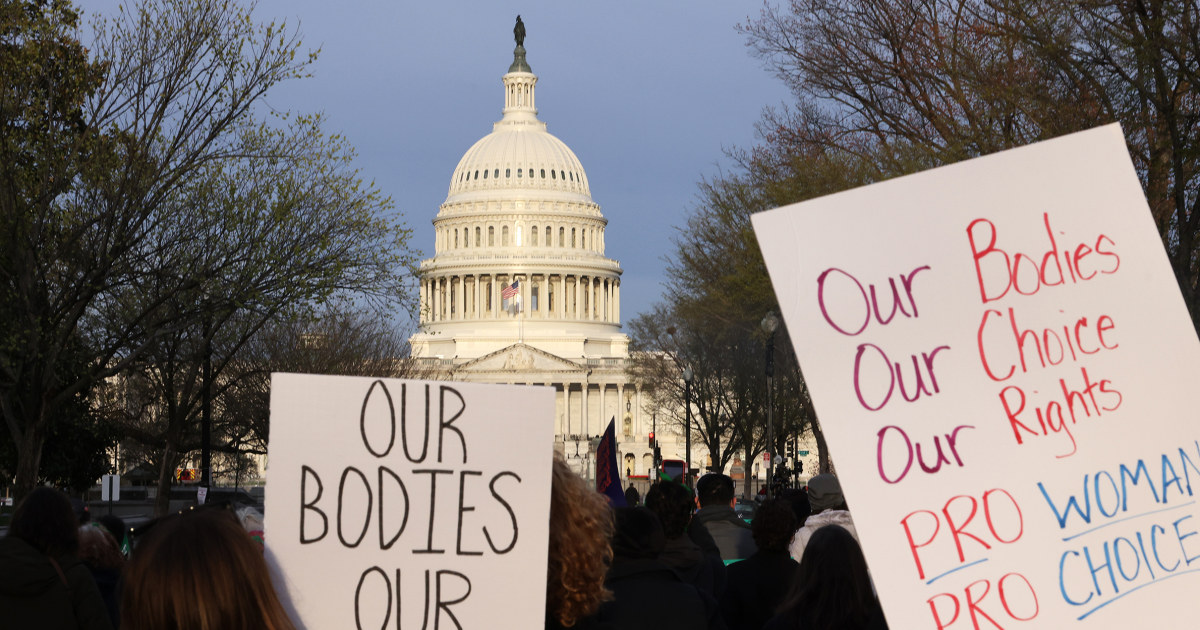WASHINGTON — The Republican-controlled House passed a military policy bill Friday that includes a series of conservative provisions targeting abortion and diversity, equity and inclusion initiatives at the Pentagon, drawing fierce objections from Democrats who mostly rejected it.
The National Defense Authorization Act passed 217-199, mostly along party lines, with just six Democrats voting for it and three conservatives breaking with the GOP to oppose it.
“This year’s NDAA will refocus our military on its core mission of defending America and its interests across the globe, fund the deployment of the National Guard to the southwest border, expedite innovation and reduce the acquisition timeline for new weaponry, support our allies, and strengthen our nuclear posture and missile defense programs,” Speaker Mike Johnson, R-La., said in a statement.
It includes a 19.5% pay raise for junior enlisted service members and bigger allowances for food and housing.
But the bill was also amended to include a provision that would “prohibit the Secretary of Defense from paying for or reimbursing expenses relating to abortion services” — undoing a policy the Biden administration put in place in 2022. It echoes Republican Alabama Sen. Tommy Tuberville’s failed attempt to pressure the Pentagon to revoke that policy of paying travel expenses related to abortions by blocking military promotions, which drew wide condemnation.
While the NDAA passed out of the Armed Services Committee overwhelmingly bipartisan, on a 57-1 vote, House Republicans then included several conservative amendments along party lines over the last two days once the bill made it to the House floor, making it controversial. That includes an amendment that would permanently freeze hiring for diversity, equity and inclusion (or DEI) jobs within the Defense Department and eliminate the department’s position of chief diversity officer. It would also bar the TRICARE health care program from providing gender transition surgeries.
“Unfortunately, House Republicans are using the NDAA — historically bipartisan legislation to support our nation’s defense — to restrict servicewomen from traveling to receive reproductive health care, including emergency medical care that could save their lives or their ability to have children,” said Rep. Abigail Spanberger, D-Va., whose district includes many service members. “I’d venture to guess that very few women serving in our military were consulted about this proposal. We should be focused on strengthening our national security, not restricting the freedoms of our troops.”
Rep. Pat Ryan, D-N.Y., said: “It’s a disgrace. I think, especially as somebody that served, to take a bill that should be about preparing for — and preventing — actual war and make it a culture war bill is really a disservice to our national security.”
The final defense policy will require a compromise between the House and Senate that can pass both chambers and be signed into law by President Joe Biden.
Sen. Tammy Duckworth, D-Ill., said that provision is dead on arrival in the Democratic-led Senate, which is advancing a different NDAA without the culture war amendments.
“That’s going to be a problem for our servicemen and women who are stationed in places where — they go there because we send them there,” Duckworth said. “I had a miscarriage, for example, while I was still serving, and I had to have a procedure in order to continue with my IVF journey. I would not have had access to that.”
Rep. Beth Van Duyne, R-Texas, the author of the abortion provision, defended it. “We should not have put that burden on our DOD budget,” she said. “But the president decided to do that with an executive order, so we had to take care of it in legislation.”
The Democrats’ House campaign arm, the Democratic Congressional Campaign Committee, quickly jumped on the amendment.
“If it’s a day that ends in ‘Y’, House Republicans will vote for national abortion restrictions,” said Viet Shelton, a spokesperson for the DCCC. “They are more interested in attacking the reproductive freedoms of our country’s service members than ensuring our troops have the support they need, and voters won’t forget how wrong these attacks are when they head to the polls in November.”
The three Republicans who opposed the legislation were Reps. Marjorie Taylor Greene, R-Ga., Thomas Massie R-Ky., and Matt Rosendale, R-Mont. The six Democrats who voted yes were Reps. Henry Cuellar, D-Texas, Don Davis, D-N.C., Jaren Golden, R-Maine, Vicente Gonzalez, D-Texas, Mary Peltola, D-Alaska, and Marie Gluesenkamp Perez, D-Wash.
Both the House and Senate will need to pass the same version of the NDAA for it to become law. Rep. Chip Roy, R-Texas, warned that many Republicans will vote against the NDAA if the abortion provision and other conservative priorities are stripped out.
“If the Senate pulls that out, that certainly imperils support from, I think, a large chunk of our conference,” he said. “And so I hope we will fight for those things and try to get our Defense Department back away from those social engineering issues and more towards the issues that are just focused on our national defense.”
Rep. Tony Gonzales, R-Texas, a Navy veteran, said he’s proud of the bill but that it is “only step one” in a process.
“We’ve got to fight and make sure that a lot of the things that we worked hard on the House stay in there,” he said. “But I think there’s a long road ahead.”



